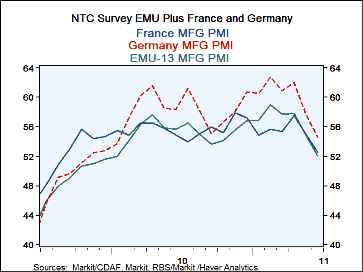 Global| Jul 01 2011
Global| Jul 01 2011Euro-Area Manufacturing Withers
Summary
The MFG PMIs tell a story of slowing growth in the Zone. Every nation’s PMIs are now is a declining mode. While Greece saw some improvement in its index this month (and how it did that we will never know) it has the lowest percentile [...]
 The MFG PMIs tell a story of slowing growth in the Zone. Every nation’s PMIs are now is a declining mode. While Greece
saw some improvement in its index this month (and how it did that we will never know) it has the lowest percentile and
queue range standings of the bunch. Greece’s queue stand of 12.9% means that Greece’s PMI measure (at 45.46) is weaker
than its current level historically only 12.9% of the time.
The MFG PMIs tell a story of slowing growth in the Zone. Every nation’s PMIs are now is a declining mode. While Greece
saw some improvement in its index this month (and how it did that we will never know) it has the lowest percentile and
queue range standings of the bunch. Greece’s queue stand of 12.9% means that Greece’s PMI measure (at 45.46) is weaker
than its current level historically only 12.9% of the time.
Greece is like most of the other countries whose data appear in the table in one respect: it is only 9.8 points from its cycle high. To compare, the overall Zone index is only 7 points off its cycle high. But for Greece its index also is only 7.3 points up from its cycle low and for the Zone as whole the measure is up some 18 points from its cycle low reading. While Greece is not all that far off its cycle peak it really has not had much of a cycle peak.
The queue percentiles tell a tale of some woe. The overall EMU index while standing at the 68th percentile of its range- a respectable-sounding figure- is only at the 47th percentile of its queue. The high-lows of the Euro-Area range are such that at its current level the Euro-Area reading is closer to the range top than to its distended range bottom so its overall percentile reading seems to be OK and moderate. But if we rank the Euro-Area observations in an ordered queue and calculate where the month’s reading stands it has more values above it (53%) than below it (47%). Only German’s MFG PMI is over the 50% mark in its queue, and its standing is bolstering the EMU reading. After Germany the ‘high’ queue readings are Austria (49.25%), The Netherlands (48.5%), and France (45.5%). In the broader EU the UK reading is still above the 50% mark of its queue, but barely at 50.8%. None of these readings is particularly impressive or reassuring.
With this month’s weakness in the MFG PMI’s Europe has sunk to a clear sub-par level of performance for MFG which has been its leading sector.
With the Greek problems being handled and as yet no evidence of default or contagion, maybe the Zone can begin to repair its self. However, we are also about to face and ECB rate hike. So the Zone is still not out of the woods and, of course, Greece, as an issue, is only temporarily handled it is not a problem-solved; there may still be some bad news on the near horizon for Greece and for others.
Robert Brusca
AuthorMore in Author Profile »Robert A. Brusca is Chief Economist of Fact and Opinion Economics, a consulting firm he founded in Manhattan. He has been an economist on Wall Street for over 25 years. He has visited central banking and large institutional clients in over 30 countries in his career as an economist. Mr. Brusca was a Divisional Research Chief at the Federal Reserve Bank of NY (Chief of the International Financial markets Division), a Fed Watcher at Irving Trust and Chief Economist at Nikko Securities International. He is widely quoted and appears in various media. Mr. Brusca holds an MA and Ph.D. in economics from Michigan State University and a BA in Economics from the University of Michigan. His research pursues his strong interests in non aligned policy economics as well as international economics. FAO Economics’ research targets investors to assist them in making better investment decisions in stocks, bonds and in a variety of international assets. The company does not manage money and has no conflicts in giving economic advice.
More Economy in Brief
 Global| Feb 05 2026
Global| Feb 05 2026Charts of the Week: Balanced Policy, Resilient Data and AI Narratives
by:Andrew Cates






